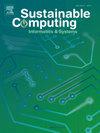Multi-heterogeneous renewable energy scheduling optimization based on time series algorithm and green computing-driven sustainable development
IF 5.7
3区 计算机科学
Q1 COMPUTER SCIENCE, HARDWARE & ARCHITECTURE
引用次数: 0
Abstract
The integration of heterogeneous renewable energy sources, such as wind and solar, poses significant challenges to the dynamic economic and environmental dispatch of power systems due to their intermittent and uncertain nature. Efficient coordination between generation and consumption is crucial to ensure stability, reduce emissions, and lower costs. Accurate forecasting of renewable outputs is a critical prerequisite for achieving optimal dispatch decisions. To address this, we propose a hybrid prediction and scheduling framework that leverages time series forecasting to support real-time dispatch optimization. Specifically, we develop a novel prediction model based on a Completely Input and Output-connected Long Short-Term Memory (CIAO-LSTM) network, whose parameters are optimized using an Improved Fruit Fly Optimization Algorithm (IFOA). This approach enhances the model’s ability to capture both linear and nonlinear temporal features and improves convergence through adaptive search strategies. The predicted outputs are then incorporated into a rolling real-time scheduling model that jointly minimizes generation costs and pollutant emissions. Simulation results on a six-unit power system demonstrate that our approach significantly improves prediction accuracy and dispatch performance, reducing average generation costs and emissions by over 8 % and 16 %, respectively. These results confirm the effectiveness of the proposed method in promoting green and sustainable power systems.
基于时间序列算法的多异构可再生能源调度优化与绿色计算驱动的可持续发展
风能和太阳能等异质可再生能源的整合,由于其间歇性和不确定性,对电力系统的动态经济和环境调度提出了重大挑战。发电和用电之间的有效协调对于确保稳定、减少排放和降低成本至关重要。可再生能源产出的准确预测是实现最优调度决策的关键先决条件。为了解决这个问题,我们提出了一个混合预测和调度框架,利用时间序列预测来支持实时调度优化。具体而言,我们建立了一种基于完全输入输出连接的长短期记忆(CIAO-LSTM)网络的预测模型,该模型的参数使用改进的果蝇优化算法(IFOA)进行优化。该方法增强了模型捕捉线性和非线性时间特征的能力,并通过自适应搜索策略提高了收敛性。然后将预测输出纳入滚动实时调度模型,以共同最小化发电成本和污染物排放。在一个六机组电力系统上的仿真结果表明,该方法显著提高了预测精度和调度性能,平均发电成本和排放分别降低了8% %和16% %。这些结果证实了所提出的方法在促进绿色和可持续电力系统方面的有效性。
本文章由计算机程序翻译,如有差异,请以英文原文为准。
求助全文
约1分钟内获得全文
求助全文
来源期刊

Sustainable Computing-Informatics & Systems
COMPUTER SCIENCE, HARDWARE & ARCHITECTUREC-COMPUTER SCIENCE, INFORMATION SYSTEMS
CiteScore
10.70
自引率
4.40%
发文量
142
期刊介绍:
Sustainable computing is a rapidly expanding research area spanning the fields of computer science and engineering, electrical engineering as well as other engineering disciplines. The aim of Sustainable Computing: Informatics and Systems (SUSCOM) is to publish the myriad research findings related to energy-aware and thermal-aware management of computing resource. Equally important is a spectrum of related research issues such as applications of computing that can have ecological and societal impacts. SUSCOM publishes original and timely research papers and survey articles in current areas of power, energy, temperature, and environment related research areas of current importance to readers. SUSCOM has an editorial board comprising prominent researchers from around the world and selects competitively evaluated peer-reviewed papers.
 求助内容:
求助内容: 应助结果提醒方式:
应助结果提醒方式:


